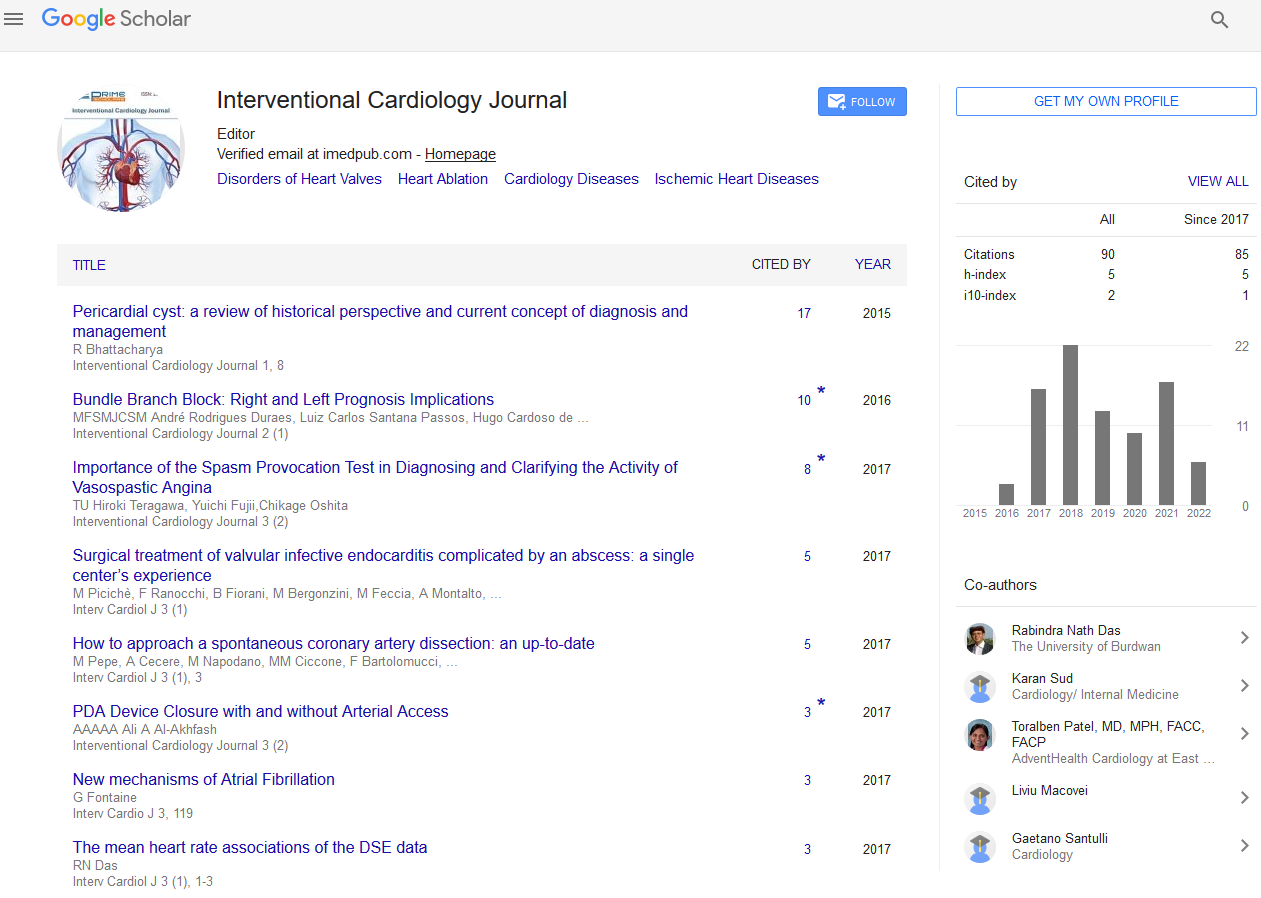Commentary - (2022) Volume 8, Issue 11
Electrophysiologists are Typically used to Refer to Cardiologists who have Expertise in this Area
Jane Carey*
Department of Cardiology, University of Sydney, Australia
*Correspondence:
Jane Carey,
Department of Cardiology, University of Sydney,
Australia,
Email:
Received: 31-Oct-2022, Manuscript No. IPIC-22-15216;
Editor assigned: 02-Nov-2022, Pre QC No. IPIC-22-15216 (PQ);
Reviewed: 16-Nov-2022, QC No. IPIC-22-15216;
Revised: 21-Nov-2022, Manuscript No. IPIC-22-15216 (R);
Published:
28-Nov-2022, DOI: 10.21767/2471-8157.8.11.52
Description
Clinical cardiovascular electrophysiology is a part of the clinical
specialty of cardiology and is worried about the review and
treatment of musicality problems of the heart. Electrophysiologists
are typically used to refer to cardiologists who have expertise
in this area. The heart's electrical activities are studied in
detail by electrophysiologists in their training. For the purpose
of assisting or directing treatment for heart rhythm disturbances
(arrhythmias), electrophysiologists collaborate closely with
other cardiologists and cardiac surgeons. They are educated to
treat cardiac arrhythmia through surgical and interventional
procedures. After medical school, the eight years of training required
to become an electrophysiologist consist of three years
of internal medicine residency, three years of clinical cardiology
fellowship, and two years of clinical cardiac electrophysiology.
This is necessary because electrophysiology is one of the most
challenging subspecialties in modern medicine due to the high
level of complexity of the patients it treats and the constant
advancements in methods and equipment. Any of a variety of
invasive (intracardiac) and noninvasive recordings of spontaneous
electrical activity and cardiac responses to programmed
electrical stimulation is an electrophysiology study. Assessment
of arrhythmias, elucidation of symptoms, evaluation of abnormal
electrocardiograms, risk of developing arrhythmias in the
future, and treatment design are the goals of these studies.
Electrophysiologists are educated in the therapeutic and surgical
approaches that can be utilized to treat numerous heart
rhythm disturbances in addition to performing diagnostic tests
of the heart's electrical properties. Antiarrhythmic drug therapy
and the surgical implantation of pacemakers and implantable
cardioverter-defibrillators are two of the therapeutic modalities
utilized in this field. Holter and event monitor recording
and interpretation as part of ambulatory electrocardiographic
monitoring; In electrophysiology (EPS), pacing and recording
electrodes are inserted either into the esophagus (intra-esophageal EPS) or directly into the heart chambers (intra-cardiac
EPS) through blood vessels in an effort to measure the electrical
properties of the heart and, in the case of intra-cardiac EPS,
to electrically stimulate it in an effort to induce arrhythmias for
the purpose of diagnosing the patient. Catheter-based ablation
of heart lesions using radiofrequency, cryotherapy (destructive
freezing), microwave, or ultrasound energy to treat or control
arrhythmias is known as ablation therapy. The electrophysiology
study, in which arrhythmias are attempted to be induced
and the mechanism of the arrhythmia for which ablation therapy
is sought, typically takes place simultaneously with ablation.
Among the "non-complex" ablations are those for arrhythmias
like: CTI-dependent atrial flutter, accessory pathway-mediated
tachycardia, and AV nodal reentrant tachycardia.
Conclusion
Additionally, the majority of our current electro-anatomic
mapping systems can incorporate cardiac CT or MR images
to superimpose electrical activity on anatomic structures. In
electrophysiology (EPS), pacing and recording electrodes are
inserted either into the esophagus (intra-esophageal EPS) or
directly into the heart chambers (intra-cardiac EPS) through
blood vessels in an effort to measure the electrical properties
of the heart and, in the case of intra-cardiac EPS, to electrically
stimulate it in an effort to induce arrhythmias for the purpose
of diagnosing the patient.
Acknowledgement
The author is grateful to the journal editor and the anonymous
reviewers for their helpful comments and suggestions.
Conflict of Interest
The author declared no potential conflicts of interest for the
research, authorship, and/or publication of this article.
Citation: Carey J (2022) Electrophysiologists are Typically used to Refer to Cardiologists who have Expertise in this Area. Interv
Cardiol J. 11:52.
Copyright: © 2022 Carey J. This is an open-access article distributed under the terms of the Creative Commons Attribution License,
which permits unrestricted use, distribution, and reproduction in any medium, provided the original author and source
are credited.

